MD General Medicine Admission – Complete Guide to PG Medical Seats in India
Introduction
General Medicine has always remained the foundation of modern healthcare. Every major hospital, research center, and medical college depends on skilled general physicians who can diagnose, manage, and treat a wide spectrum of adult diseases. If you are an MBBS graduate with strong clinical interest and a passion for patient care, then MD General Medicine Admission is the perfect step toward a fulfilling and respected medical career.
This guide will give you everything you need to know about the admission journey. You will discover eligibility criteria, detailed admission process, counselling timelines, seat distribution, fee structure, management quota pathways, NRI quota opportunities, cut-off trends, and career prospects after MD General Medicine in India. Whether your NEET PG rank is high or average, you will learn the exact strategies to secure a postgraduate medical seat in General Medicine.
What is MD General Medicine?
MD in General Medicine is a three-year postgraduate medical degree designed for MBBS graduates who want to become expert physicians. The program focuses on diagnosing, preventing, and treating adult diseases while building advanced clinical decision-making skills. Unlike surgical branches that emphasize operative techniques, General Medicine emphasizes internal medicine, evidence-based practice, and patient-centered care.
During the course, students undergo rigorous training in:
- Clinical diagnosis – identifying complex and multi-system diseases.
- Preventive medicine – promoting long-term wellness and reducing risk factors.
- Patient management – handling chronic conditions such as diabetes, hypertension, asthma, and cardiovascular diseases.
- Critical care – exposure to emergency medicine, ICU management, and life-saving interventions.
MD General Medicine also provides extensive rotations in sub-specialties like:
- Cardiology – heart and vascular disorders.
- Neurology – nervous system conditions.
- Endocrinology – hormonal and metabolic diseases.
- Gastroenterology – digestive and liver disorders.
- Nephrology – kidney diseases and dialysis care.
- Infectious diseases – diagnosis and management of emerging infections.
This makes it the gateway to super-specialty DM courses such as Cardiology, Neurology, Nephrology, and Gastroenterology. As a result, MD General Medicine graduates become the first point of contact in hospitals for patients with multi-system illnesses, making them indispensable in India’s healthcare system.
Why Choose MD General Medicine?
When it comes to postgraduate medical education in India, MD General Medicine continues to be one of the most sought-after specialties. Thousands of MBBS graduates choose this branch every year, and the reasons are clear. Let’s explore why MD General Medicine stands out among all PG medical courses.
🔹 Broad Career Scope
An MD in General Medicine opens doors to multiple career opportunities. You can work as a consultant physician, lead hospital departments, or become an academician in medical colleges. At the same time, the course builds a strong foundation for those planning to pursue super-specialty DM courses.
🔹 High Demand Across India and Abroad
Every hospital, whether government or private, needs qualified general physicians. Clinics, corporate hospital chains, and diagnostic centers consistently hire MD General Medicine graduates because they form the backbone of patient care. With lifestyle diseases like diabetes and hypertension increasing worldwide, the demand is only getting stronger.
🔹 Gateway to Super-Specialties
MD General Medicine is often described as the entry point to DM programs. After completing this degree, doctors can specialize further in Cardiology, Neurology, Nephrology, Gastroenterology, Pulmonology, Endocrinology, and more. This pathway ensures long-term career growth and recognition.
🔹 Patient-Centric Role
Unlike many super-specialized branches where interaction is limited to a narrow focus, General Medicine allows you to build long-term relationships with patients. From diagnosis to follow-up care, physicians play a vital role in guiding patients through every stage of their health journey. This continuous care helps establish trust and credibility.
🔹 Global Recognition
An MD in General Medicine is not just respected in India but also recognized worldwide. Countries across the Middle East, Europe, and North America value internal medicine specialists, which means Indian graduates often find lucrative opportunities abroad after clearing licensing exams like PLAB, USMLE, or DHA.
Eligibility Criteria for MD General Medicine Admission
If you are planning to apply for MD General Medicine Admission in India, you must carefully check the eligibility rules laid down by the National Medical Commission (NMC) and respective counselling authorities. Since admission happens only through NEET PG counselling, fulfilling each requirement is mandatory.
Here are the criteria explained in detail:
🔹 1. MBBS Degree from a Recognized University
You must hold an MBBS degree approved by the NMC (formerly MCI). The degree should be obtained from a recognized medical college in India or an equivalent qualification from abroad (for FMGs after clearing FMGE/NExT, if applicable).
🔹 2. Completion of Rotating Internship
A one-year compulsory rotating internship must be completed before the counselling deadline. Candidates still undergoing internship are allowed to appear for NEET PG but must finish it before seat allotment.
🔹 3. NEET PG Qualification
A valid NEET PG score is the single gateway to all MD/MS admissions in India. Without qualifying NEET PG 2025, admission is not possible—even for management quota or NRI quota seats.
🔹 4. Registration for Counselling (AIQ + State)
- For 50% All India Quota (AIQ) and deemed universities, candidates must register on the MCC portal.
- For state quota and private college seats, candidates must register separately with the respective state counselling authorities (like KEA in Karnataka, CET Cell in Maharashtra, RUHS in Rajasthan, KNRUHS in Telangana, etc.).
🔹 5. NRI Quota Documentation (If Applicable)
Students applying for NRI quota admission in MD General Medicine need to provide:
- Valid NRI/OCI/Foreign passport.
- Sponsorship affidavit from an eligible NRI relative.
- Proof of relationship and financial support.
👉 In short, the eligibility checklist includes:
- MBBS degree recognized by NMC
- Completed internship before counselling
- Qualified NEET PG 2025
- Registered for AIQ/State counselling
- NRI documents (if applying under NRI quota)
MD General Medicine Admission Process in India
Securing an MD General Medicine seat in India requires more than just qualifying in NEET PG. You must carefully follow the counselling process conducted by MCC and respective state authorities. Since seats are limited and competition is intense, understanding each step clearly increases your chances of admission.
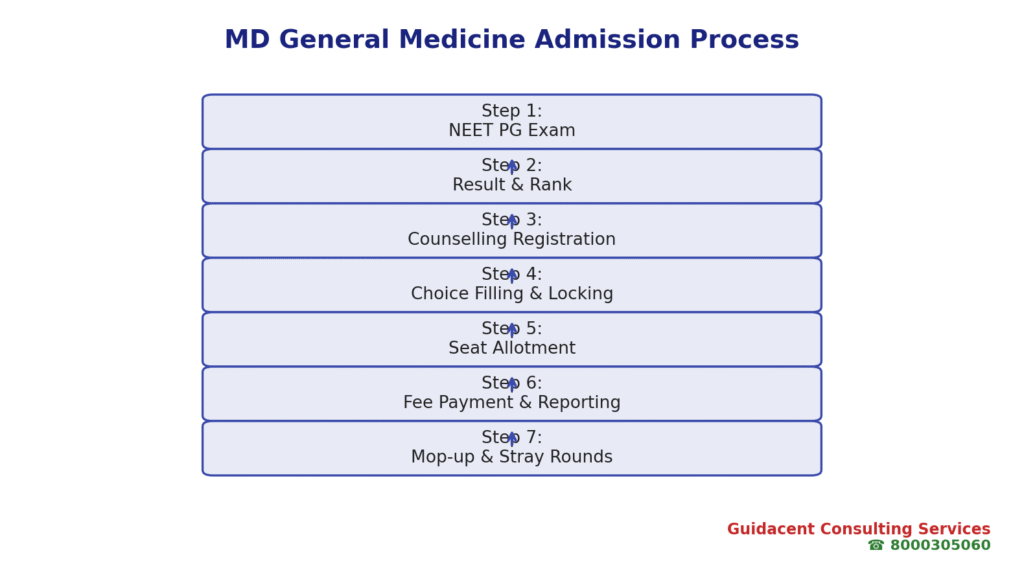
Here is the complete admission process explained in detail:
🔹 Step 1: NEET PG Examination
The journey begins with the NEET PG exam, conducted annually by the National Board of Examinations in Medical Sciences (NBEMS). This computer-based test evaluates your knowledge across all MBBS subjects and serves as the single gateway to all MD/MS and DNB courses in India.
🔹 Step 2: Result Declaration & Rank
Once results are announced, candidates receive an All India Rank (AIR). This rank determines your eligibility for:
- 50% All India Quota (AIQ) seats in government colleges.
- Deemed university and central institute seats (through MCC counselling).
- State quota and private college seats (through state authorities).
- Management and NRI quota seats (via state or institutional counselling).
🔹 Step 3: Counselling Registration
You cannot secure admission without registering for counselling.
- MCC Counselling → Handles AIQ seats, deemed universities, central universities (e.g., AMU, BHU, Delhi University), and ESIC institutions.
- State Counselling Authorities → Manage 50% state quota seats in government colleges and 100% seats in private medical colleges within the state.
👉 Example: KEA (Karnataka), CET Cell (Maharashtra), RUHS (Rajasthan), KNRUHS (Telangana).
🔹 Step 4: Choice Filling & Locking
After registration, candidates must fill and lock their choices of colleges and specialties. This step is crucial because your allotment depends entirely on the order of your preferences, your NEET PG rank, and the seat matrix.
🔹 Step 5: Seat Allotment
Based on your rank, category, quota, and preferences, a seat allotment list is published. Candidates who receive allotment must download the allotment letter and proceed to the next step.
🔹 Step 6: Fee Payment & Reporting
Selected candidates need to pay the admission fees and report to the allotted college with original documents for verification. Failure to report within the deadline may result in losing the seat.
🔹 Step 7: Mop-up & Stray Vacancy Rounds
If you don’t get a seat in the initial rounds, you can still participate in the mop-up and stray vacancy rounds. These rounds are conducted to fill leftover seats, especially in deemed universities and private colleges. Many students secure admission through this stage.
👉 In summary, the MD General Medicine admission process in India follows this sequence:
- Qualify NEET PG → Get AIR rank
- Register for counselling → MCC & state authorities
- Fill and lock choices → College + specialty preferences
- Seat allotment → Merit + quota-based
- Pay fees and report → Complete admission formalities
- Participate in mop-up/stray rounds → Last chance for unfilled seats
MD General Medicine Seats in India
India offers one of the largest pools of MD General Medicine seats in the world. With rising demand for skilled physicians, both government and private medical colleges are steadily increasing capacity. Based on current trends, MD General Medicine seat matrix is expected to look like this:
- Government Colleges → 4,000+ seats
Highly subsidized, most sought-after, and secured through strong NEET PG ranks. - Private Colleges → 3,500+ seats
Available through state quota and management quota. Popular in Karnataka, Maharashtra, Tamil Nadu, and Telangana. - Deemed Universities → 1,500+ seats
Managed through MCC counselling, often with higher fees but excellent infrastructure. - DNB (Equivalent) → 2,000+ seats
Postgraduate training offered through NBEMS-accredited hospitals across India, considered equivalent to MD/MS.
👉 Total MD General Medicine seats (including DNB) = 11,000+
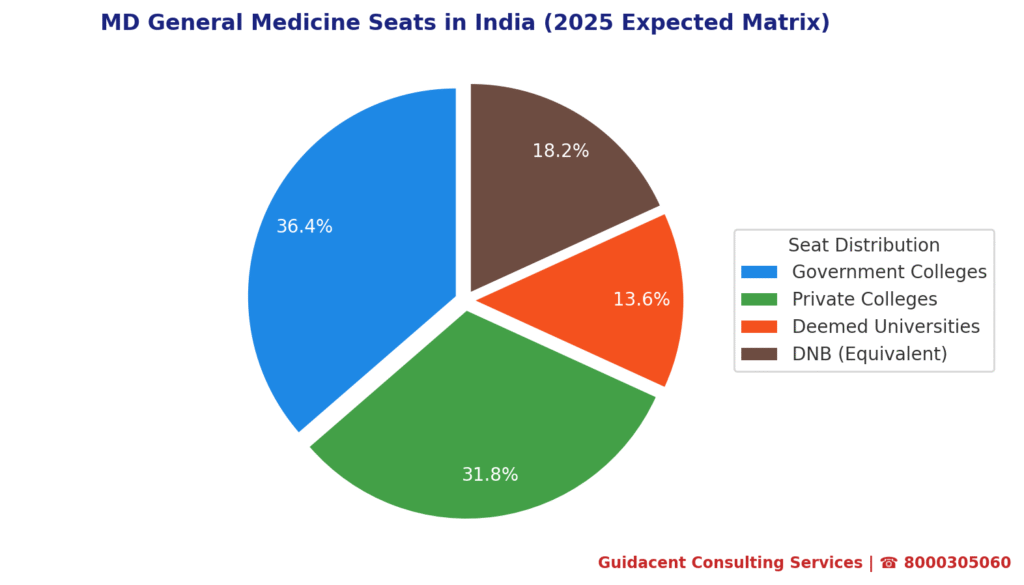
This distribution ensures opportunities across different categories, but competition remains intense due to the high demand for General Medicine PG seats.
MD General Medicine Fees Structure (2025)
| Type of College / Quota | Annual Fees / Package (Approx.) | Notes |
|---|---|---|
| Government Colleges | ₹1–2 Lakhs per year | Subsidized tuition; highly competitive due to limited seats. |
| Private Medical Colleges (State Quota) | ₹15–25 Lakhs per year | Varies by state; Karnataka, Maharashtra, and Tamil Nadu are popular choices. |
| Deemed Universities | ₹30–40 Lakhs per year | Managed through MCC counselling; often includes advanced infrastructure. |
| Management Quota | ₹60–90 Lakhs (total package) | Direct admission option; suitable for students with lower NEET PG ranks but higher budget. |
| NRI Quota | $75,000–$120,000 per year | Reserved for NRI/OCI/Foreign nationals; requires valid documentation and sponsorship. |
👉 Note: Fees vary widely depending on state, college reputation, and infrastructure. Always confirm during counselling before finalizing admission.
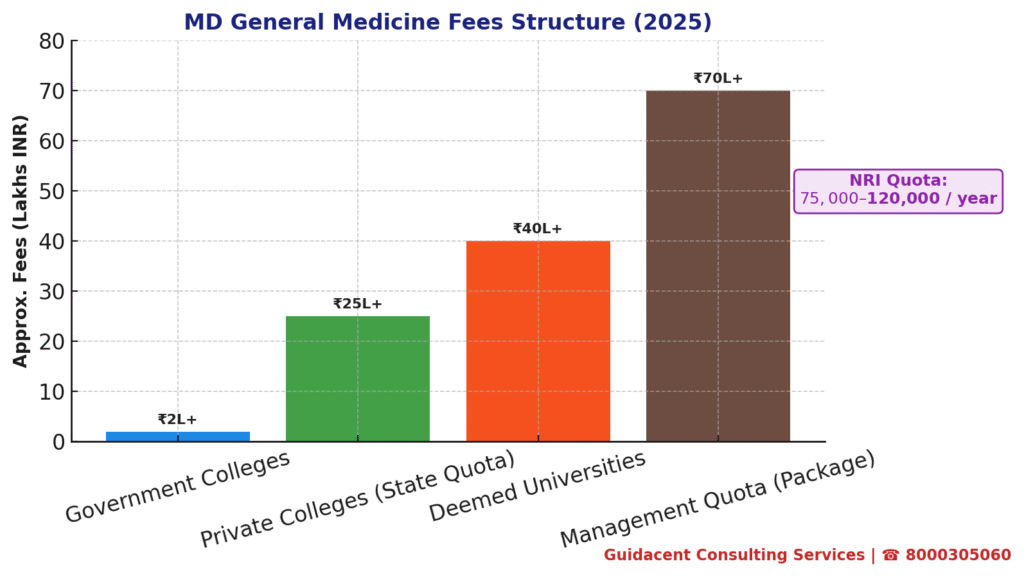
MD General Medicine Cut-off Trends (2021–2024)
One of the most important factors for securing a seat in MD General Medicine is your NEET PG rank. Since the number of applicants keeps increasing every year, the cut-off ranks for government, private, and deemed universities show a rising trend.
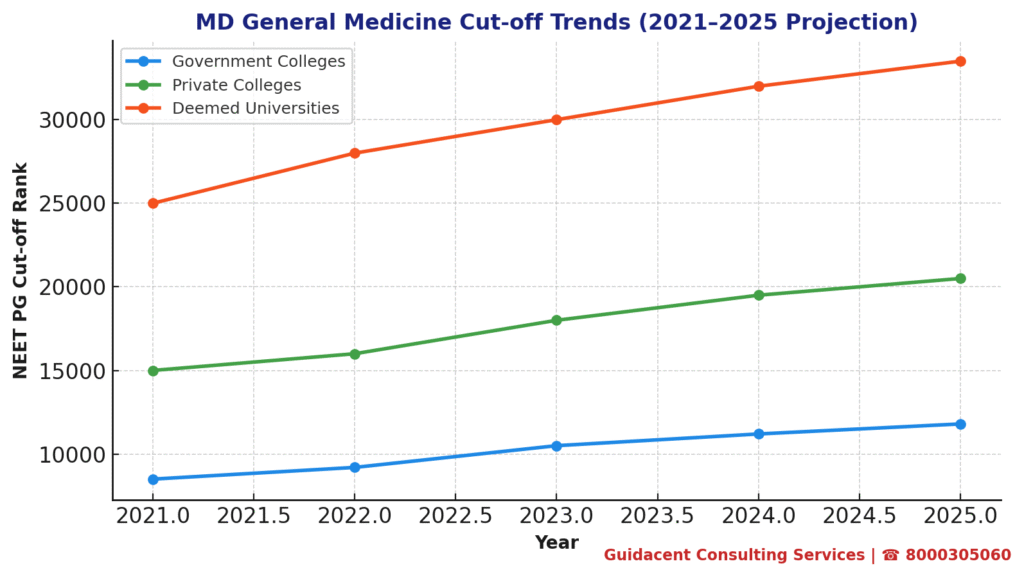
By analyzing the past four years (2021–2024), aspirants can estimate their chances for 2025 and plan their counselling strategy more effectively.
MD General Medicine Cut-off Trends
| Year | Government Colleges | Private Colleges | Deemed Universities |
|---|---|---|---|
| 2021 | 8,500 | 15,000 | 25,000 |
| 2022 | 9,200 | 16,000 | 28,000 |
| 2023 | 10,500 | 18,000 | 30,000 |
| 2024 | 11,200 | 19,500 | 32,000 |
👉 Looking at the trend, the cut-off for 2025 is expected to be slightly higher, especially in government and private colleges where competition is extremely intense.
MD General Medicine Admission Through Management Quota
Not every student secures a top NEET PG rank, but that does not mean the dream of becoming a physician ends. For those who miss out on government and state quota seats, the management quota in private medical colleges offers a practical alternative.
🔹 Why Management Quota?
- Direct admission route – You do not need an extremely high NEET PG rank.
- Flexible options – Seats are available in some of the best private colleges across India.
- Transparency in packages – The cost is higher than state quota fees but provides certainty of admission.
🔹 States Offering Management Quota MD General Medicine Seats
Management quota seats are widely available in:
- Karnataka – Hub for PG admissions, especially Bangalore colleges.
- Maharashtra – Strong clinical exposure and top-tier hospitals.
- Tamil Nadu – Known for academic excellence and affordable management packages.
- Telangana – Popular for availability in private medical universities.
- Rajasthan – Increasing demand due to relatively moderate fee structures.
- Delhi NCR – Attractive for students due to proximity and hospital tie-ups.
🔹 Fee Packages (Approximate 2025 Range)
- Management Quota Packages → ₹45 Lakhs to ₹70 Lakhs for the full 3-year course.
- Fees vary by college reputation, infrastructure, patient flow, and location.
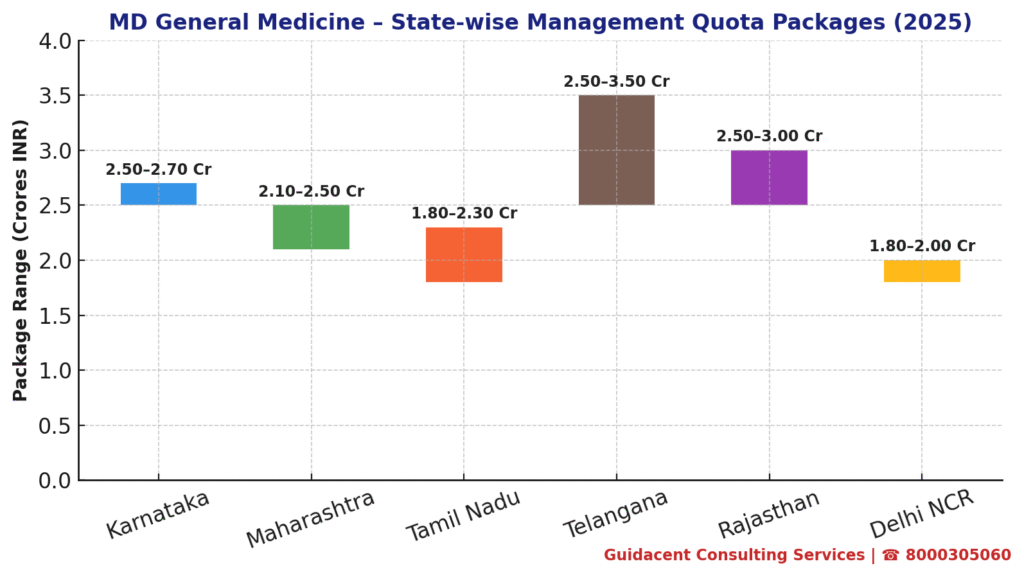
👉 Many students with average NEET PG scores opt for management quota seats to secure admission in reputed private colleges without losing a year.
MD General Medicine Admission Through NRI Quota
For students of NRI, OCI, or foreign nationality, the NRI quota provides a direct opportunity to secure an MD General Medicine seat in India’s top private and deemed medical universities. These seats are reserved exclusively for international candidates, ensuring that deserving students with global roots can pursue postgraduate medical education in India.
Key Features of NRI Quota Admission
- Reserved Seats → A percentage of seats in almost every private and deemed medical university is allocated to NRI/OCI/Foreign applicants.
- Mandatory Sponsorship → Candidates must present a sponsorship letter from an eligible NRI relative or guardian.
- Valid Documentation → Proof of NRI/OCI status, relationship documents, and passport copies are required for verification.
- Higher Fee Bracket → Fees are structured in USD and remain higher than Indian student quotas, but they guarantee access to prestigious institutions.
Fee Structure for NRI Quota (2025)
- Annual Fees → $75,000 – $120,000 (depending on state and college).
- Payments are made in USD, often via bank transfers as per college guidelines.
Popular States for NRI Quota MD General Medicine Seats
- Karnataka → Known for high clinical exposure in Bangalore and Mangalore medical colleges.
- Tamil Nadu → Consistently attracts international students due to strong academics and hospital tie-ups.
- Maharashtra → Offers some of the most reputed medical colleges for NRI students.
- Telangana & Delhi NCR → Growing number of NRI seats due to rising demand.
👉 With proper documentation and NEET PG qualification, NRI students can secure seats without competing for highly restrictive government quota ranks.
State-wise MD General Medicine Admission (2025)
India has a diverse PG medical admission landscape, and state-wise counselling authorities manage the allocation of MD General Medicine seats. Each state differs in counselling rules, tuition fees, and demand. Here’s a breakdown:
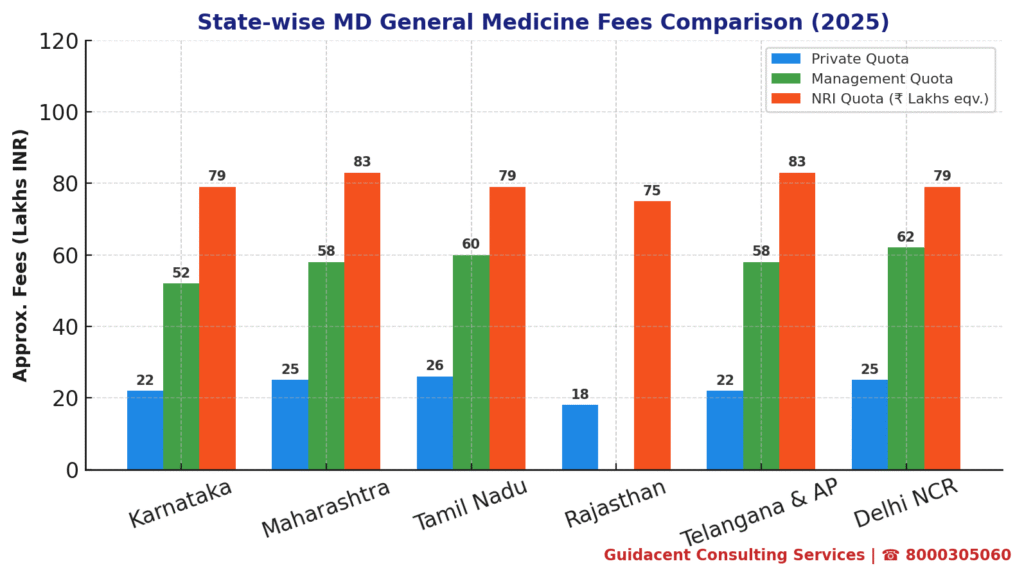
🔹 1. Karnataka
Karnataka remains the hub for PG medical education with several reputed private colleges in Bangalore and Mangalore.
- Counselling Authority: KEA (Karnataka Examination Authority)
- Fees: ₹18–25 Lakhs (Private Quota), ₹45–60 Lakhs (Management Quota)
🔹 2. Maharashtra
Known for excellent clinical exposure, Maharashtra attracts many aspirants from across India.
- Counselling Authority: CET Cell
- Fees: ₹20–30 Lakhs (Private Quota), ₹50–65 Lakhs (Management Quota)
🔹 3. Tamil Nadu
Popular for strong academics, Tamil Nadu colleges offer robust training and exposure.
- Counselling Authority: State Counselling Committee
- Fees: ₹22–28 Lakhs (Private Quota), ₹50–70 Lakhs (Management Quota)
🔹 4. Rajasthan
Rajasthan has become attractive due to relatively affordable private college fees.
- Counselling Authority: RUHS (Rajasthan University of Health Sciences)
- Fees: ₹15–22 Lakhs (Private Quota)
🔹 5. Telangana & Andhra Pradesh
Both states are growing hubs for PG admissions, offering good infrastructure and patient exposure.
- Counselling Authorities: KNRUHS (Telangana) & Dr. NTRUHS (Andhra Pradesh)
- Fees: ₹18–25 Lakhs (Private Quota), ₹50–65 Lakhs (Management Quota)
🔹 6. Delhi NCR (Uttar Pradesh & Haryana)
The Delhi NCR belt attracts many students due to proximity, hospital tie-ups, and availability of management quota seats.
- Counselling Authorities: DGME (UP) & Haryana State Committee
- Fees: ₹20–30 Lakhs (Private Quota), ₹55–70 Lakhs (Management Quota)
📊 State-wise MD General Medicine Fees (2025)
| State | Counselling Authority | Private Quota Fees | Management Quota Fees |
|---|---|---|---|
| Karnataka | KEA | ₹18–25 Lakhs | ₹45–60 Lakhs |
| Maharashtra | CET Cell | ₹20–30 Lakhs | ₹50–65 Lakhs |
| Tamil Nadu | State Counselling Committee | ₹22–28 Lakhs | ₹50–70 Lakhs |
| Rajasthan | RUHS | ₹15–22 Lakhs | — |
| Telangana & AP | KNRUHS & Dr. NTRUHS | ₹18–25 Lakhs | ₹50–65 Lakhs |
| Delhi NCR (UP, HR) | DGME (UP) & Haryana State Counselling | ₹20–30 Lakhs | ₹55–70 Lakhs |
State-wise MD General Medicine Colleges of India
- List of PG Medical College in Karnataka
- List of PG Medical Colleges in Maharashtra
- List of PG Medical Colleges in Rajasthan
- List of PG Medical Colleges in Tamil Nadu
- List of PG Medical Colleges in Andhra Pradesh
- List of PG Medical Colleges in Chhattisgarh
- List of PG Medical Colleges in Haryana
- List of PG Medical Colleges in Punjab
- List of PG Medical Colleges in Uttar Pradesh
- List of PG Medical Colleges in Uttarakhand
- List of PG Medical Colleges in West Bengal
- List of PG Medical Colleges in Telangana
- List of PG Medical Colleges in Andaman & Nicobar
- List of PG Medical Colleges in Arunachal Pradesh
- List of PG Medical Colleges in Assam
- List of PG Medical Colleges in Bihar
- List of PG Medical Colleges in Chandigarh
- List of PG Medical Colleges in Dadra & Nagar Haveli
- List of PG Medical Colleges in Daman & Diu
- List of PG Medical Colleges in Delhi
- List of PG Medical Colleges in Goa
- List of PG Medical Colleges in Gujrat
- List of PG Medical Colleges in Himachal Pradesh
- List of PG Medical Colleges in Jammu & Kashmir
- List of PG Medical Colleges in Jharkhand
- List of PG Medical Colleges in Kerala
- List of PG Medical Colleges in Manipur
- List of PG Medical Colleges in Meghalaya
- List of PG Medical Colleges in Mizoram
- List of PG Medical Colleges in Nagaland
- List of PG Medical Colleges in Odisha
- List of PG Medical Colleges in Puducherry
- List of PG Medical Colleges in Sikkim
- List of PG Medical Colleges in Tirupur
Career Scope After MD General Medicine
An MD in General Medicine is not just a degree — it is a career gateway to multiple opportunities in India and abroad. Graduates are highly sought after in hospitals, research centers, and academic institutions because of their ability to manage a wide range of diseases. The scope extends far beyond clinical practice, making it one of the most rewarding PG medical specialties.
🔹 1. Super-Specialty (DM Courses)
Most MD General Medicine graduates aim to specialize further by pursuing DM (Doctorate of Medicine) programs. Some of the most popular super-specialty branches include:
- DM in Cardiology – Advanced training in heart and vascular diseases.
- DM in Neurology – Expertise in disorders of the brain, spine, and nervous system.
- DM in Gastroenterology – Specialization in digestive and liver conditions.
- DM in Nephrology – Advanced kidney disease management, including dialysis and transplant.
- DM in Endocrinology – Focus on hormonal, thyroid, and metabolic disorders.
👉 Completing a DM ensures top-tier roles in hospitals and global recognition.
🔹 2. Hospitalist / Consultant Physician
General Medicine graduates often work as consultant physicians in multi-specialty hospitals, corporate healthcare chains, and private clinics. As the first point of contact for patients, physicians are highly respected and in constant demand.
🔹 3. Academics & Teaching
Many graduates choose to join medical colleges as faculty members, shaping the next generation of doctors. Academic careers are stable, respected, and offer research opportunities alongside teaching.
🔹 4. Research & Clinical Trials
With the global rise of clinical research, MD General Medicine doctors are recruited by pharmaceutical companies, CROs (Contract Research Organizations), and global health institutes to lead or participate in drug trials, clinical studies, and evidence-based research.
🔹 5. Private Practice
Another lucrative option is to start a private clinic or hospital setup. With strong patient relationships and long-term care models, private practice ensures both financial independence and personal satisfaction.
💰 Earning Potential After MD General Medicine
- In India → Average salary ranges between ₹15–35 Lakhs per year, depending on city, hospital, and experience.
- Abroad → Doctors earn between $80,000–$150,000 annually, especially after clearing licensing exams like USMLE (USA), PLAB (UK), DHA/MOH (Middle East).
Challenges in MD General Medicine Admission
While MD General Medicine is one of the most rewarding postgraduate medical courses, the admission journey is not without challenges. Every aspirant must be aware of the hurdles before planning their counselling strategy.
🔹 1. High Competition
Every year, thousands of MBBS graduates compete for a limited number of seats in MD General Medicine. Since it is considered the foundation for many super-specialties like cardiology, neurology, and nephrology, the demand far exceeds the available seats. As a result, government quota cut-offs are very high, and even private colleges witness intense competition.
🔹 2. High Fees in Private Colleges
For students who do not secure government seats, private institutions and deemed universities become the next option. However, the fees in private medical colleges are significantly higher, especially under management quota and NRI quota. Packages often range from ₹45 Lakhs to ₹70 Lakhs (management) and $75,000–$120,000 per year (NRI), making it a major financial commitment for families.
🔹 3. Seat Blocking and Fraudulent Agents
One of the biggest risks during counselling is seat blocking by unauthorized agents. Many students fall prey to false promises of guaranteed admission without official procedures. To avoid such fraud, it is always recommended to:
- Register only through official MCC or state counselling portals.
- Verify details directly with the college administration.
- Work only with authorized, transparent consulting services.
👉 Being informed about these challenges ensures that aspirants can plan wisely, secure seats legally, and avoid unnecessary stress.
FAQs – MD General Medicine Admission
Q1. Is NEET PG mandatory for MD General Medicine admission?
👉 Yes, NEET PG is compulsory for all seats, including management and NRI quotas.
Q2. What is the minimum rank required for MD General Medicine in private colleges?
👉 Generally below 20,000 rank is safe, but it varies by state and college.
Q3. Can I get MD General Medicine with a low NEET PG score?
👉 Yes, through management quota and NRI quota seats.
Q4. Which states have the most MD General Medicine seats?
👉 Karnataka, Maharashtra, Tamil Nadu, Telangana, and Uttar Pradesh.
Q5. What is the scope after MD General Medicine?
👉 You can become a consultant physician or pursue DM in super-specialty fields.
Student Testimonies for Guidacent Consulting Services
“Thank you, Guidacent! Because of your guidance, I secured an MD General Medicine seat in a renowned private college in Karnataka under the management quota. My NEET PG rank wasn’t high enough for a government seat, but your accurate seat predictions, step-by-step help with counselling forms, and documentation support made all the difference. I couldn’t have done it without you.”
— Pooja S., Bangalore
“I was anxious about applying through the NRI quota, unfamiliar with documentation and fee structure. Guidacent helped me understand all the details clearly — from the sponsorship letter to selecting the right college. I’m now pursuing MD General Medicine in Maharashtra with confidence. Extremely grateful for their responsive team.”
— Arjun M., Mumbai
“What impressed me most about Guidacent was their transparency. They showed me a clear breakup of fees (private, management, NRI), provided realistic cut-off trends, and guided me to colleges where I had a shot. Because of their help, I didn’t waste time or money chasing unreachable seats. Best decision I made!”
— Nikita P., Chennai
“I got admission into an MD General Medicine course through state quota (private college) in Telangana. Guidacent’s help with choice filling, locking, and even local college inspections made my admission smooth. They even helped with reporting & document verification. Highly recommend their services.”
— Rahul D., Hyderabad
How Guidacent Consulting Services Helps You
At Guidacent Consulting Services Pvt. Ltd., we simplify your admission journey.
- Expert Counselling – State-wise & MCC counselling guidance.
- Seat Matrix Updates – Real-time data on available seats.
- Direct Admission Support – Assistance for management and NRI quota seats.
- Transparent Packages – No hidden costs.
- Personalized Strategy – Tailored counselling for low NEET PG ranks.
📞 Call us today at 8000305060 for a free counselling session.
Conclusion
MD General Medicine remains the most sought-after PG course in India. With limited seats, high demand, and rising competition, strategic counselling is the key. Whether you aim for a government seat, private quota, management seat, or NRI quota, your success depends on timely decisions, accurate guidance, and expert planning.
At Guidacent, we ensure that every student finds the right seat within their budget and career aspirations.
Top Demanded MD MS Admission Branches in India
- Anesthesia
- General Medicine
- Dermatology, Venerelogy & Leprology
- Paediatric
- Psychiatry
- Radiology
- TB & Chest / Pulmonary Medicine /Respiratory Medicine
- ENT
- General Surgery
- Obstetrics and Gynecology (OBG )
- Ophthalmology
- Orthopedics
- Anatomy
- Physiology
- Biochemistry
- Pharmacology
- Pathology
- Microbiology
- Community Medicine
- Forensic Medicine
Guidacent has helped many MBBS graduates secure clinical PG seats with ethical, counselling-first guidance.
Disclaimer: Fees, cut-offs, and schedules are indicative and may change. Always confirm with the official counselling authority and the latest prospectus.
